
The rufous-backed wren is a songbird of the family Troglodytidae. It is a resident breeding species from southwest Mexico to northwestern Costa Rica.

The lyre-tailed nightjar is a species of nightjar in the family Caprimulgidae. It is found in Argentina, Bolivia, Colombia, Ecuador, Peru, and Venezuela.

The white-headed wren is a species of bird in the family Troglodytidae. It is found in Colombia and Panama.
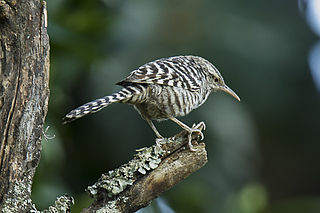
The fasciated wren is a species of bird in the family Troglodytidae. It is found in Ecuador and Peru.

The bicolored wren is a species of bird in the family Troglodytidae. It is found in Colombia, Venezuela, Guyana, and Brazil.
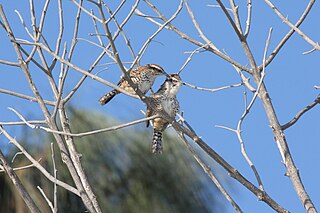
The spotted wren is a species of bird in the family Troglodytidae. It is endemic to Mexico.

Boucard's wren is a species of bird in the family Troglodytidae. It is endemic to Mexico.

The grey-mantled wren is a species of bird in the family Troglodytidae. It is found in Bolivia, Colombia, Ecuador, and Peru.

The timberline wren is a species of bird in the family Troglodytidae. It is found in Costa Rica and western Panama.
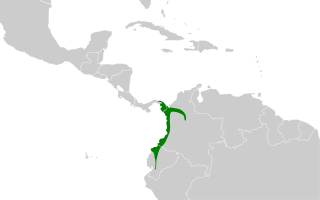
The stripe-throated wren is a species of bird in the family Troglodytidae. It is found in Colombia, Ecuador, and Panama.
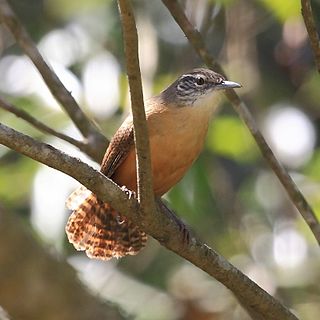
The buff-breasted wren is a species of bird in the family Troglodytidae. It is found in the Amazon Basin of northern Brazil and Amazonian Colombia, Ecuador, Peru and northern-border Bolivia, and also the Guianan countries of Guyana, Suriname, and French Guiana. It occurs in non-Amazonian regions of Venezuela and Colombia and its range extends into eastern Panama.

The spot-breasted wren is a species of bird in the family Troglodytidae. It is found in Belize, Costa Rica, El Salvador, Guatemala, Honduras, Mexico, and Nicaragua.

The whiskered wren is a species of bird in the family Troglodytidae. It is found in Colombia, Ecuador, and Venezuela.

The speckle-breasted wren is a species of bird in the family Troglodytidae. It is found in Colombia, Ecuador, and Peru.

The superciliated wren is a species of bird in the family Troglodytidae. It is found in Ecuador and Peru.

The mountain wren is a species of bird in the family Troglodytidae. It is found in the Andes of northwestern Argentina, Bolivia, Colombia, Ecuador, Peru, and western Venezuela.

The white-bellied wren is a species of bird in the family Troglodytidae. It is found in Belize, Guatemala, Honduras, and Mexico.

The cactus wren is a species of wren endemic to the deserts of the southwestern United States and northern and central Mexico. It is the state bird of Arizona, and the largest wren in the United States. Its plumage is brown, with black and white spots as markings. It has a distinctive white eyebrow that sweeps to the nape of the neck. The chest is white, whereas the underparts are cinnamon-buff colored. Both sexes appear similar. The tail, as well as flight feathers, are barred in black and white. Their song is a loud raspy chirrup; akin in the description of some ornithologists to the sound of a car engine that will not start. It is well-adapted to its native desert environment, and the birds can meet their water needs from their diet which consists chiefly of insects, but also of some plant matter. The cactus wren is a poor flier and generally forages for food on the ground. Ornithologists generally recognize seven subspecies, with the exact taxonomy under dispute.
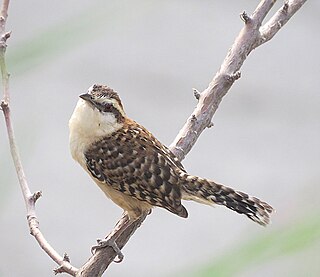
Sclater's wren is a songbird of the family Troglodytidae. It is endemic to Mexico.

The Veracruz wren is a songbird of the family Troglodytidae. It is endemic to Mexico.























